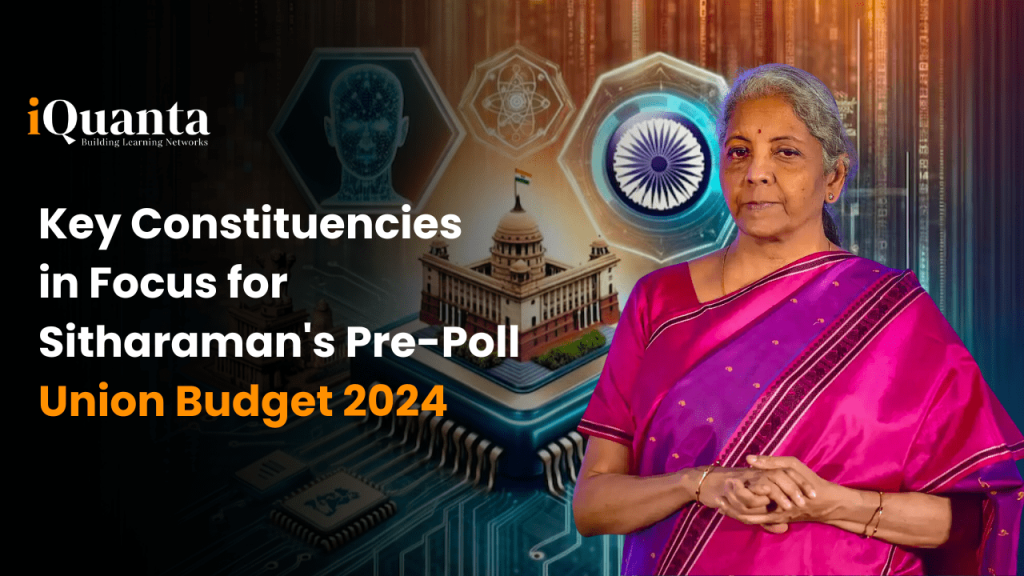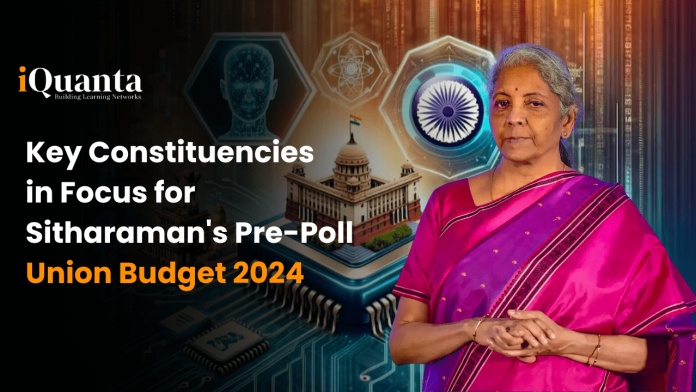
Genre : Finance
Expectations among voters are high for the highly anticipated interim budget of 2024, evoking memories of the incredible haul seen in the interim budget of 2019. A few months away are the Lok Sabha elections, and Finance Minister Nirmala Sitharaman has the difficult job of striking a balance between meeting the requirements of the economy and important vote blocs. In this research, we focus on the important stakeholders that Sitharaman is likely to take into account when making financial decisions.

India’s Rural Villagers: Their Predicament
Inflation, unpredictable weather patterns, and low demand have all affected agriculture and lives in rural India. Companies that sell consumer goods note a discernible decline in the increase of rural volume, highlighting the necessity of focused interventions. Sitharaman may decide to use initiatives and incentives such to those included in the 2019 interim budget, which provided small farmers with an annual payment of Rs 6,000, to accelerate the recovery of rural demand.
The Taxpayers: A Problem of the Middle Class
Sitharaman cannot afford to deny the growing middle class in India the budgetary benefits they are entitled to, given the pressures of inflation they face. Income-tax relief is expected to return. It was a major component of the previous interim budget for people making up to Rs 500,000. Appeasing this important voting bloc, which is recognized for its sensitivity and importance, can be accomplished by providing basic relief to the lowest end of the middle class and making compliance easier.
Women: Strengthening the Quiet Opponent
Due to their significant population share and underrepresentation in the workforce, female voters constitute a crucial demographic. Political parties have developed specialized programs to appeal to women voters, realizing the increasing significance of this group. Sitharaman may concentrate on tackling issues related to low female labour force participation, financial empowerment, and integrating women into the mainstream of the economy.
Other Backward Castes (OBCs): A Crucial Voting Bloc
With their demands for a caste census and allegations of lesser participation in government positions, OBCs have become a crucial electoral group. Benefits tailored to a particular caste may not be possible, but Sitharaman might focus on groups like artisans who have a high proportion of OBCs. Expanding upon Prime Minister Narendra Modi’s PM Vishwakarma scheme, she might provide incentives, streamlined lending procedures, and skill-building opportunities to help this demographic.
Budgetary Approach
Sitharaman has made reference to a conservative budget that excludes anything “spectacular.” Rather, she is probably going to take a more practical stance and concentrate on pushing programs and policies that require less financial investment. This balanced approach is in line with the government’s pledge to uphold the fiscal glidepath and meet the requirements of important groups that are essential to winning elections.
Conclusion
All eyes will be on Nirmala Sitharaman as she traverses the complex landscape of political imperatives and economic demands as the interim budget deadline draws near. The government’s capacity to achieve a careful balance between meeting the demands of important constituents and upholding sound fiscal management will determine how well the budget performs. Other Backward Castes (OBCs), women, the middle class, and rural India all play a significant role in determining the results of elections. The effectiveness of Sitharaman’s measures in reviving rural demand, helping the middle class, empowering women, and taking OBCs’ concerns seriously will be closely examined. These groups provide a problem that necessitates careful governmental actions since they each have different expectations.
The budget is important because it sets the tone for the government’s commitment to equitable development and economic stability, even beyond its immediate financial commitments. Sitharaman is conscious of the tightrope she must tread, as seen by her cautious attitude. The government hopes to escape the traps of fiscal profligacy while fostering trust across a variety of voting groupings by providing specific initiatives.
In the end, the 2024 interim budget is more than just a financial blueprint—rather, it is a political declaration outlining the government’s priorities leading up to the elections. Sitharaman’s choices will be closely examined not only for their immediate effects but also for the message they send about the direction of the country’s economy and the commitment of the government to advancing the interests of its heterogeneous citizenry. The narrative for the upcoming election fight will be shaped in the months that follow the budget presentation, demonstrating how popular these initiatives are with voters.

